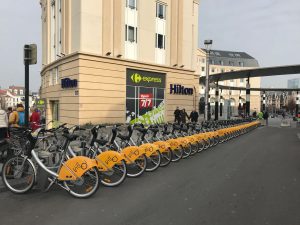Brussels, the capital of Belgium and the European Union, is a people magnet with 1.139 million inhabitants and more than 6.78 million overnight stays of tourists per year. This leads to a high amount of car traffic on Brussels’ streets. For everyone who does not want spend time in traffic at every corner needs to use other ways of transportation – for example a bicycle! Sharing services are getting more and more popular and the bicycle sharing business is no exception for this. But, is it still recommendable to enter the existing market in Brussels as a bike sharing provider? Or are there already too many sharks in the tank?
Big sharks: Tough competition
Several bicycle sharing providers are already established in the market. The biggest market share has Villo. In 2017 their bright yellow bikes got rented more than 1,600,000 times. They offer regular bikes and when walking through the city centre, one passes a rental station every 500 meters. It should be also noted, that the government supports this provider. The first 30 rental minutes are for free, two hours cost for example 3.60 euros. Among the other competitors are also oBike or the electric bike provider Billy. Both providers do not work with pick-up and drop-off stations but offer the possibility to park the bike anywhere, as members use GPS to find the nearest bike.

 Jumping into the tank: Existing opportunities for a market entry
Jumping into the tank: Existing opportunities for a market entry
Brussel keeps expanding its bike lanes, within the last 5 years the available lanes increased by 67%. The demand is still high, and people enjoy the flexibility that a rental bike provides. Tourists rent it for sightseeing and locals use it to commute faster as well as to contribute to a healthy lifestyle. When asking people at bike stations what their experience is, they comment that they mostly rent a bike on a daily basis. However, they also mention that the existing bikes are heavy, not very modern and Brussel itself offers a challenge due to its uneven paths. Additionally, sometimes the bikes pool all at one station while others are empty. Thus, a new provider could position itself as an electro bike sharing service with modern bikes and an optimized system of regulating the bikes at the stations. Offering additional safety equipment like helmets could help to differentiate itself from the competition.
A too crowded tank: The final market entry recommendation
After researching the bicycle sharing market of Brussels and having a look at several renting stations throughout the city, one has to come to the conclusion that a market entry for a new provider is not recommended. The existing competition is hard and well established. Others have tried and not succeeded. For example, the Hong Kong based provider GoBee Bikes stopped its service in Brussel after only three months as their bikes got “maliciously and severely damaged” and all the profit went into repairing the bikes. Thus, a bike rental provider should keep looking for “a bigger tank with less sharks”.
